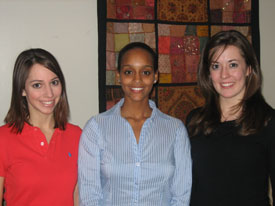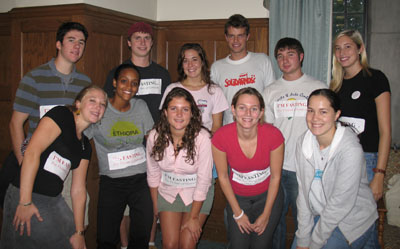
|
March 2006 Co-Founders of UR-AID Hope to Raise Global Awareness Elleni Ghebremicael and Ashley Weathersbee, both leadership studies minors, and fellow University of Richmond student Alicia Surdyk co-founded a campus chapter of Americans for Informed Democracy (AID) last spring after attending one of the organization’s conferences in Berlin. AID, a nonpartisan, nonprofit organization with a mission to raise global awareness, engages college and university students in education and advocacy in support of a collaborative U.S. role in the world.
The three Richmond students were studying abroad in fall 2004—Ghebremicael in Scotland and Weathersbee and Surdyk in France—when they learned of the AID conference from professors at their respective international universities. All three attended the conference, and all three came away inspired to share AID’s message of global awareness with the University of Richmond community. “When we were abroad we became very aware of how uninformed many American students are,” Ghebremicael said. “We wanted to kill the stereotypes of Americans as uninformed and apathetic.” UR-AID aims to do just that. At each of the organization’s bi-monthly meetings, a student makes a presentation on a current international issue he agreed to research for the meeting and then the floor opens for discussion, a format employed in and modeled after many Jepson classes, Ghebremicael and Weathersbee said. In addition to being informative, the meetings often inspire participants to advocacy. “After presenting and discussing the facts of a particular issue,” Ghebremicael said, “we bring it home by asking, what is America doing about this? And what are busy UR students doing about this? We provide Web site addresses for grassroots organizations and contact information for congressmen so that students attending the meetings can take action.” UR-AID also holds several well-publicized events each semester to support one or more of the international organization’s current initiatives. High-profile speakers from national and international organizations address issues such as global poverty, environmental conservation and the relationship between Muslims and the Western world. The campus chapter exercises a lot of autonomy in choosing which AID initiatives it wants to profile, Ghebremicael said. For example, during the week AID designated for the “Fighting for What’s Right” initiative, the UR-AID chapter focused on genocide in the Sudan and sponsored a day of fasting to raise awareness of the Sudanese victims.
AID recognized Ghebremicael for the many innovative events she planned as part of the “Fighting for What’s Right” initiative by selecting her as one of its first eight recipients of the Outstanding Student Leaders Award. Both Ghebremicael and Weathersbee want to continue their advocacy of international issues after graduating this May. Ghebremicael plans to spend two years in New York City as a teacher for Teach for America before pursuing a master’s degree and then a doctorate in public policy. In the meantime, she joined the AID Board of Trustees this January and will stay in touch with the campus chapter of AID, she said. Weathersbee is taking a year off between college and graduate school to work as an au pair for a French-speaking family in Switzerland. Eventually she, like Ghebremicael, would like to work in international relations. Ghebremicael and Weathersbee credited their Jepson education with showing them that leadership is a process between leaders and followers and doesn’t have to adhere to a top-down model. They deliberately adopted a nonhierarchical structure for UR-AID, which they believe has contributed to its success among students. Jepson also helped them develop as individuals, they said. “Being a Jepson student helped me clarify my strengths and weaknesses and become a more confident leader,” Weathersbee said. |

